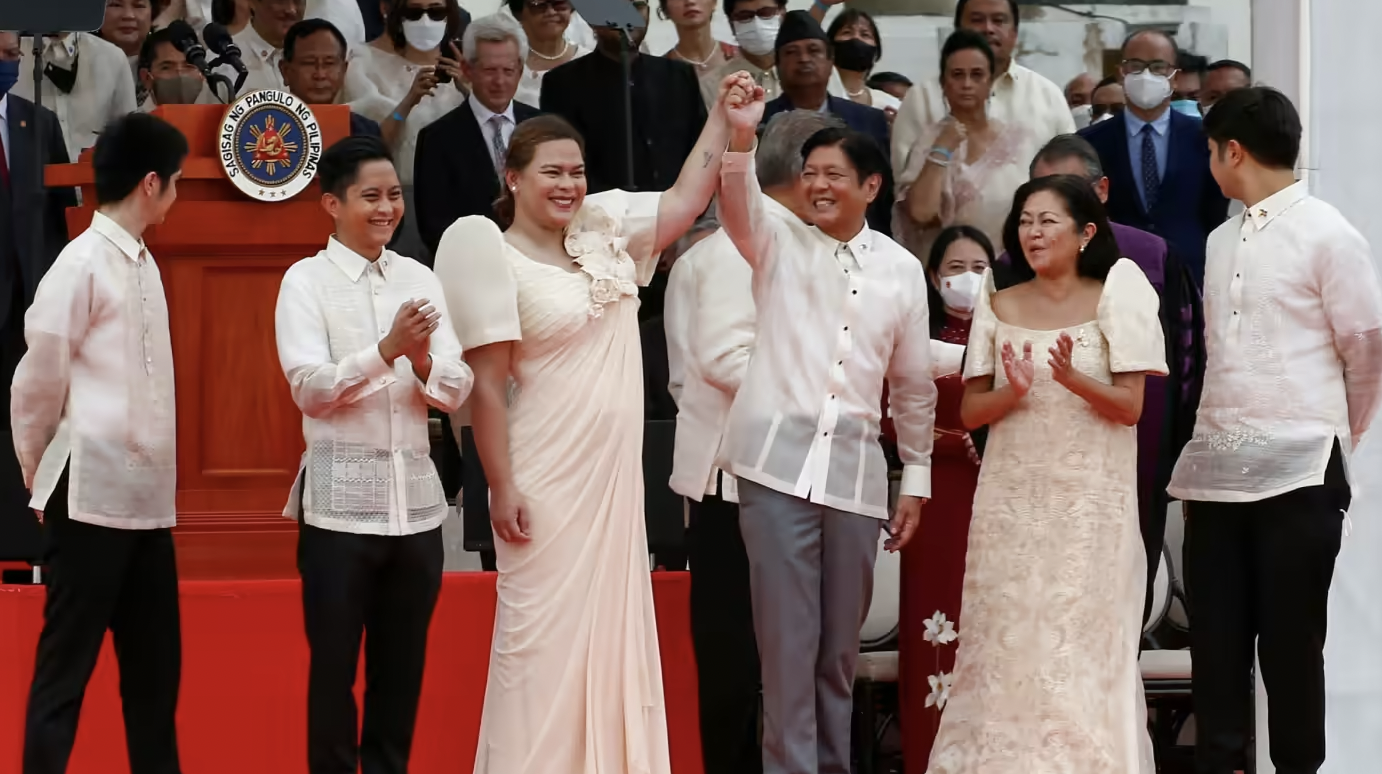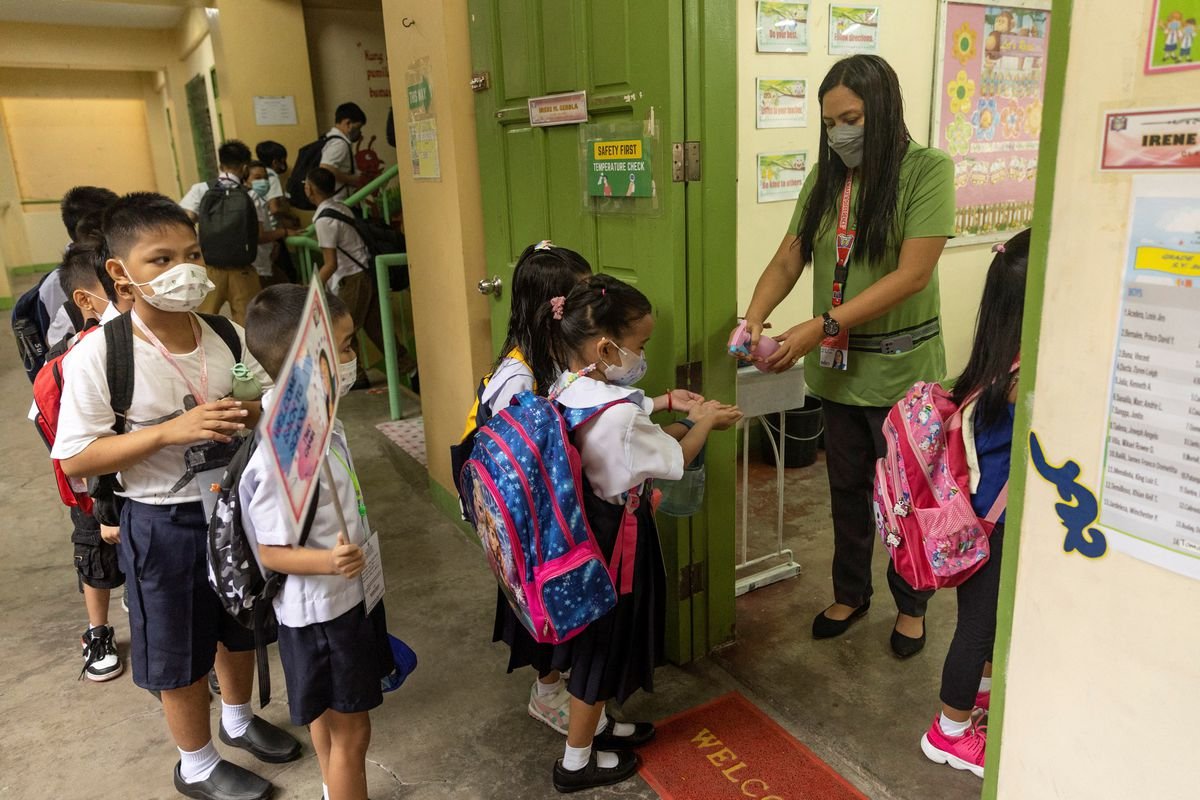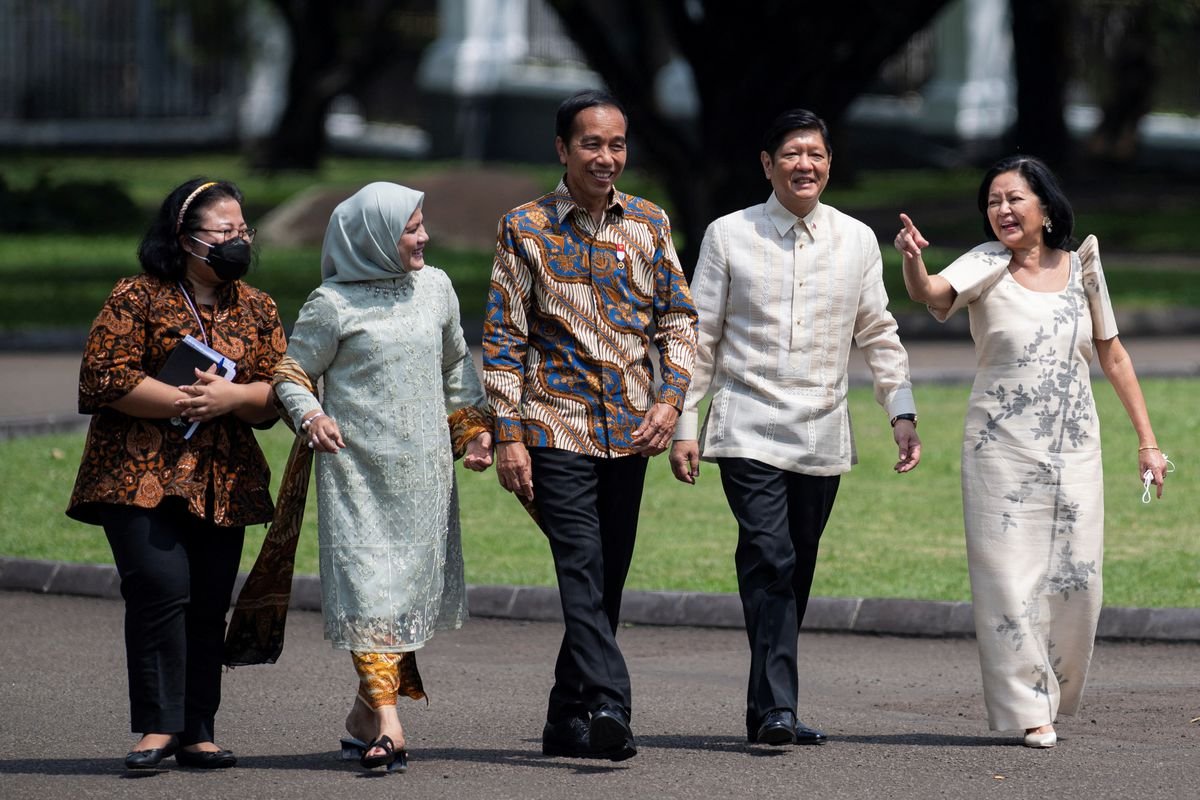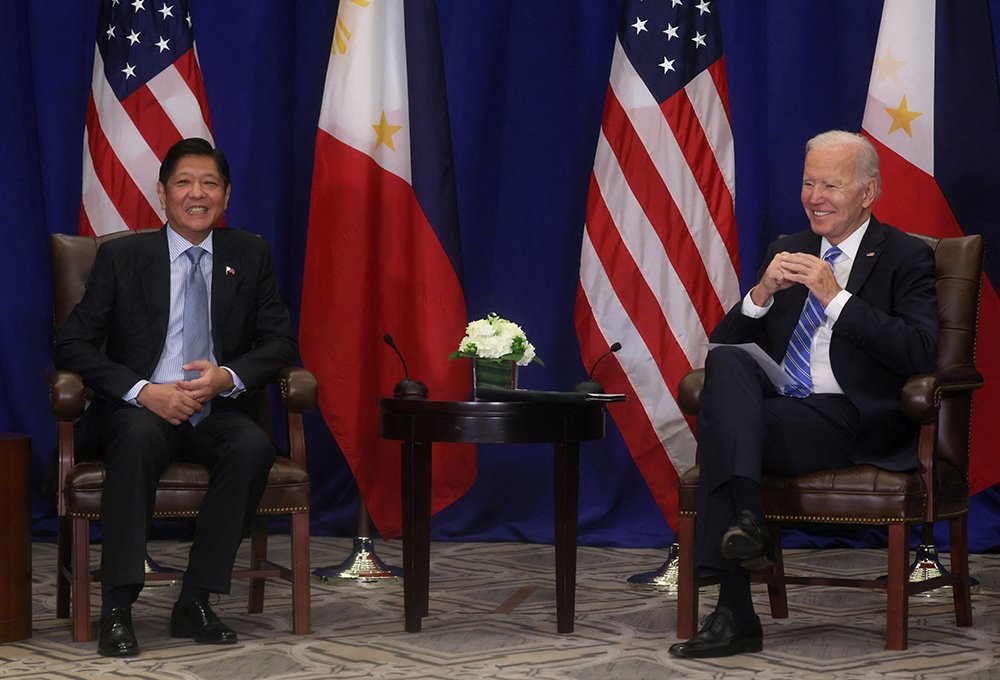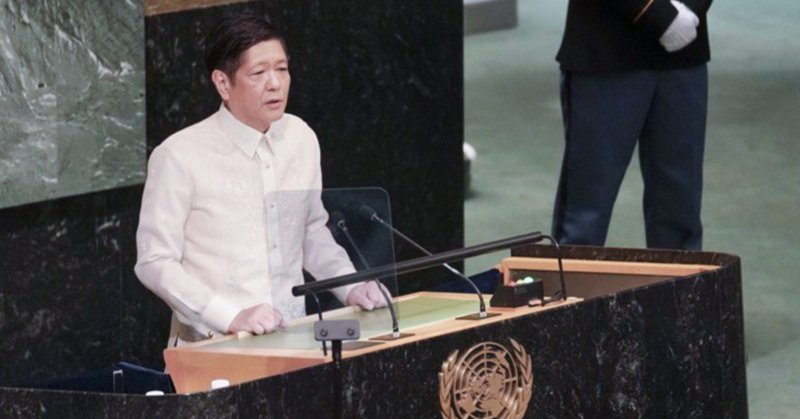Lofty Words, But Is Marcos Jr. Delivering?
/President Ferdinand “Bongbong” Marcos, Jr. and Vice President Sara Duterte during his oathtaking at the National Museum of FIne Arts (Photo by © Rolex dela Pena/EPA-EFE/Shutterstock)
But what realistically could have been done in 100 days?
Plenty, if the president decided to burn the midnight oil, so to speak, and worked long hours in pursuit of his avowed goal of “unity.”
Too little, if he did not take charge, simply coasted along, let his subalterns do the work for him, or perhaps allowed them to do as they wish.
An objective assessment of what the Marcos, Jr. administration has done in the first 100 days would point out both its positives and negatives as well as its strengths and weaknesses thus far. Readers can judge for themselves whether the new administration passes muster and deserves the trust and confidence of Filipinos in the next six years.
What BBM promised the electorate
During the presidential campaign, Bongbong Marcos consistently harped on “unity” as his overarching goal for the nation if elected.
But "unity" remained a mere slogan without any real meaning, as early on he had decided to skip presidential debates to explain his position on key issues. He said he wanted to go directly to the people rather than face the media in televised debates.
Marcos gave interviews only to news outfits he deemed friendly. He declined to take part in a presidential debate moderated by journalist Jessica Soho, because his camp said she was anti-Marcos.
He also declined to address longstanding issues, such as human rights violations and the acquisition of ill-gotten wealth during his father’s term, saying that the matter should be left for the courts to decide. Besides, he said he did not want to give the same answer again and again.
He called his vice-presidential bet, Sara Duterte, and his senatorial candidates the “UniTeam.”
The strategy work, as the May 9 polls showed his resounding victory with 31 million votes against 14 million for his toughest rival, Vice President Leni Robredo, and not even 3 million for the third placer, world boxing icon and former Senator Manny Pacquiao.
But Marcos, Jr.’s harshest critics have attributed his electoral triumph to a potent combination of disinformation by a troll army that dutifully delivered a relentless daily dose of fake news and scurrilous attacks on Leni Robredo, massive vote-buying, and hakot (bused-in) crowds in campaign rallies,
Winning the election was the easy part. Winning the hearts and minds of the population behind a viable economic recovery program in the wake of the COVID-19 pandemic could be the more difficult one.
No doubt, the new administration faces multiple economic, political, social and foreign policy challenges that will test its mettle.
The First Month: July
At his swearing-in as Chief Executive at noon of June 30 in front of the old Congress building in Manila, now the National Museum of Fine Arts, Marcos, Jr. solemnly swore to “faithfully and conscientiously fulfill my duties as President of the Philippines, preserve and defend its Constitution, execute its laws, do justice to every man, and consecrate myself to the service of the Nation. So help me God.”
The ceremony underscored a significant feature of a democratic set-up: the peaceful transfer of power from one leader to another after a generally free and fair election. The oath of office is in fact a covenant, a binding agreement to serve all the 110 million Filipino people, not just those who voted for the president in the May 9 election.
The part about defending the Constitution is perhaps the most important, since laws emanate from its key provisions and it contains the broad outlines of the duties and responsibilities of all public officials.
It must be pointed out that the 1987 Constitution that Marcos, Jr. vowed to preserve and defend is anti-dictatorship, as it explicitly provides for the protection of human rights through the creation of the Commission on Human Rights and also seeks to recover ill-gotten wealth.
The new administration started from a position of strength with a landslide victory in the last polls. This strength must be channeled into determined efforts to revitalize the economy, institute the needed reforms to improve governance, and provide vital social services such as education and health especially to the disadvantaged sectors.
Inaugural speech
Marcos’ inaugural speech on June 30 outlined his administration’s economic targets for the next six years. He said the goal is to have a 6.5 to 8 percent real gross domestic product growth annually between 2023 to 2028, and to reduce the country’s poverty rate to 9 percent by 2028. Further, Marcos said tax administration reforms would be put in place to increase revenue collection and even expand the previous administration’s Build, Build, Build infrastructure program.
His speech also focused on the critical issue of food security and the welfare of farmers and fishermen. He said the government would provide loans and financial assistance for farmers and fishermen and seek to provide cheaper farm inputs, fertilizers, pesticides, seeds, and feeds while modernizing the agriculture and livestock industry through science and technology.
Marcos also announced no more lockdowns would be imposed in the country despite the increase in COVID-19 infections. He also promised to establish the Philippines’ own Center for Disease Control and Prevention and a vaccine institute and stressed the need for more health centers and hospitals across the country.
Marcos backed the return to full face-to-face classes starting in September and noted that the K-to-12 basic education system is being carefully reviewed.
Children going back to school for face-to-face classes in the Philippines. The teacher sprays her students’ hands with alcohol as prevention against COVID-19 (Photo by Eloisa Lopez/ Reuters)
On foreign policy, Marcos said he would “not preside over any process that will abandon even a square inch of the territory of the Republic of the Philippines to any foreign power…With respect to our place in the community of nations, the Philippines shall continue to be a friend to all. And an enemy to none.”
Critics lamented that the new president had omitted discussing two important concerns: human rights and corruption. Was this intentional, so as not to revive memories of documented human rights violations by security forces and allegations of widespread corruption during the martial law period from 1972 to 1986?
Cabinet Appointments
Emphasizing the need for agriculture to drive economic development, Marcos chose to serve as concurrent Agriculture Secretary. He appointed Vice President Sara Duterte as Education Secretary. Among his first appointments were prominent economists to head the key departments of Finance and Trade and Industry, as well as the National Economic and Development Authority (NEDA) and the Bangko Sentral ng Pilipinas.
Marcos Jr.’s choices for his economic team earned praise from the business sector as they felt these economists could help the new administration craft the correct policies in the aftermath of the COVID-19 pandemic and bring back the Philippine economy on a track to sustained growth.
State-of-the-Nation Address
On July 25, Marcos delivered his first State-of-the- Nation Address (SONA), outlining his platform of governance for the next six years.
It touched on agrarian reform, poor workplace conditions, and intellectual property problems of those in creative industries. He also urged the Department of Migrant Workers to be accessible to overseas Filipino workers or OFWs.
Marcos discussed the need to improve public transportation, particularly railways, in the context of an accelerated infrastructure program. He also said oil supply is expected to stabilize over the medium term with prices of crude oil barrels expected to settle down towards the end of 2022.
In the meantime, he said, the government would extend cash assistance or “ayuda” and fuel subsidies to the public transport sector.
Marcos announced that the Department of Education would resume in-person classes by September, but that blended learning can still be done in some areas.
On the South China Sea, Marcos vowed to pursue a foreign policy of "friends to all, enemy to none." He made no mention of the country's tensions with Beijing in the West Philippine Sea and how he intends to assert the ruling of the Permanent Arbitral Tribunal in The Hague favoring the country in so far as maritime rights are concerned.
Reactions to the SONA were mixed.
Philippine and Chinese Coast Guard ships square off in the West Philippine Sea (Source: CNN)
“The new administration started from a position of strength with a landslide victory in the last polls.”
The Akbayan Party-List said the SONA suffered from a “crisis of clarity, direction and vision” and did not address the country's multiple crises. “Beyond Marcos Jr.'s newfound technocratic rhetoric and amusing attempt at playing economic guru, he offers nothing new, bold or extraordinary to address the country's manifold, and unparalleled crises…It severely fell short of what the country so desperately needed.”
But the new president's SONA also drew praise for addressing economic growth and high prices.
The Makati Business Club said proposals to make paying taxes easier and boosting Internet connectivity would “energize” the business sector, especially micro, small, and medium enterprises.
The German-Philippine Chamber of Commerce and Industry said they were encouraged by the new administration's focus on renewable energy given the interest from German companies to invest in the Philippines.
However, as July came to a close, Marcos announced that the government had “no intention” of rejoining the International Criminal Court (ICC), dismaying human rights groups that had supported the move of the ICC to continue gathering evidence of alleged extrajudicial killings from 2016 onwards.
The Second Month: August
In August, the new administration became embroiled in the sugar importation controversy involving the issuance by the Sugar Quota Administration (SRA) of Sugar Order No. 4 authorizing the importation of 300,000 metric tons of sugar. Malacañang disowned the order, saying that the President rejected the proposed importation.
The Senate Blue Ribbon Committee held hearings and recommended that administrative and criminal charges be filed with the Office of the Ombudsman against an undersecretary in the Agriculture department, the head of the SRA and two of its board members.
The Palace also contended that the continued high gas prices were a result of external shocks, including the Russian invasion of Ukraine. This led to a transportation crisis as some public transport operators and drivers decided not to ply the streets because they could not meet the daily needs of their families.
The peso also declined in value vis-à-vis the U.S. dollar to reach the historic high of P56-$1, and still rising.
Also in August, the Rural Missionaries of the Philippines (RMP) denounced what it said was a “Marcosian state attack” against some of its members, who are facing non-bailable charges for allegedly financing the Communist Party of the Philippines–New People’s Army (CPP-NPA).
The group called the move a “part of [the] worsening state repression against human rights defenders.”
The 2023 budget
On August 23, the House of Representatives received the P5.268-trillion proposed budget of the Marcos administration for 2023.
The first hearing of the proposed 2023 budget at the Philippine House of Representatives (Source: Rappler)
Its outstanding feature is that a third of it will be used to repay the government’s debt swollen by massive loans used to address the COVID-19 pandemic.
In his budget message, the president said: “The overall goal is to reinvigorate job creation and reduce poverty by steering the economy back to its high growth path in the near term and sustaining the high yet inclusive and resilient growth of 6.5 to 8 percent up to 2028.”
According to Speaker Martin Romualdez, the House will act with dispatch in passing the bill, and make sure that “every centavo of the national budget will be spent wisely to implement programs that would save lives, protect communities and make our economy strong and more agile.”
But critics questioned the proposed budget, pointing out that a big chunk of it would be eaten up by debt servicing for a record P1.6 trillion in debts next year, the highest yearly debt servicing on record or 29.8 percent of the total.
Under the proposed budget, the allocation for the Department of Education (DepEd) was pegged at P852.8 billion in part due to the resumption of in-person classes. But ACT Teachers Rep. France Castro described as “measly” the budget set aside for DepEd, noting that at least P1.3 trillion should be allocated to the department. Critics also questioned DepEd’s ₱150-million “confidential fund.”
The agriculture sector will get P184.1 billion, P30.5 billion of which will be set aside for the national rice program to “help maintain the price of rice at affordable levels and for the production of other vital agricultural commodities.”
But the proposed budget allocation that raised eyebrows was that for the Office of the Vice President (OVP), which is seeking a total of P2,305,396,000 funding for next year, or more than thrice the budget allocated for the office in 2022. Critics noted that the OVP budget featured too many discretionary funds not subject to audit by the Commission on Audit (COA).
The Third Month: September
State visits to Indonesia and Singapore
President Marcos, Jr. went on state visits to Indonesia and Singapore from September 6-8. He described his trips to the two Southeast Asian neighbors as “fruitful and engaging.”
Philippine President Marcos Jr. and his wife Louise Araneta-Marcos with Indonesian President Joko Widodo and wife Iriana Joko Widodo during Marcos, Jr. visit to Indonesia (Source: Reuters)
“We renewed our commitment to stronger bilateral cooperation as fellow Asean [Association of Southeast Asian Nations)] members and as two of the largest maritime nations in the world,” Marcos said.
The Philippines and Singapore signed agreements on counterterrorism, personal data protection, digital cooperation, water resource management, and investment, Marcos said.
The two visits yielded a total of $14.36 billion worth of investment pledges in the sectors of renewable energy, data centers, e-commerce, broadband technology, startups, government housing, and agriculture. “This will support our country’s economic recovery efforts and create more jobs for Filipinos here in our country,” Marcos said.
Working visit to the United States
On the first day of his working visit to the United States on September 19, Marcos Jr. underscored the importance of the Philippines’ relationship with the United States, saying he could not see a future for the Philippines without the US as its partner.
In remarks at the New York Stock Exchange, Marcos pointed out how American corporations are among the drivers of the Philippines’ early economy, adding that the strongest corporate benefactors to the government were from the US.
Marcos met with American firms related to energy and defense.
He first met with NuScale Power, which designs and markets small modular reactors, then with Wastefuel, a California-based next-generation waste-to-fuels firm. He also held talks with Boeing, which is among the largest global aerospace manufacturers and among the top defense contractors worldwide.
The highlight of his US visit, however, was his brief meeting with US President Joe Biden, who reaffirmed the United States’ “ironclad commitment to the defense of the Philippines” during the meeting held on the sidelines of the 77th Session of the United Nations General Assembly.
Marcos, for his part, assured Biden that Manila would remain Washington’s ally in “maintaining the peace in Asia,” as they discussed the situation in the South China Sea and “underscored their support for freedom of navigation and overflight, and the peaceful resolution of disputes” in the region.
Marcos, Jr. with U.S. President Joseph R. Biden (Source: Reuters)
Speech at the UN General Assembly
Marcos, Jr. at the United Nations (Source: Philippine News Agency)
In his first three months in office, President Ferdinand “Bongbong” Marcos, Jr. tackled mainly domestic issues and concerns. But on September 20, he had the unique opportunity to bring his key advocacies to the United Nations General Assembly in New York City.
In his speech at the UN, Marcos emphasized that disputes should only be resolved through peaceful means, citing the 1982 United Nations Convention on the Law of the Sea: “By reinforcing the predictability and stability of international law, particularly the 1982 UNCLOS, we provided an example of how states should resolve their differences: through reason and through right,” he said.
The President also called on all nations to take part in the common effort to fight the effects of climate change. He described climate change as the “greatest threat” affecting all countries and people.
Marcos, Jr. likewise cited the need for investments in food security for a “future that is resilient and inclusive” where people can be “healthy, happy, and secure.”
Echoing his call for unity in the country, Marcos, Jr. called on world leaders to unite as they move and shape the world’s transformation: “The future beckons and we can embark upon that journey as single nations or as a world in harmony.”
Setback for human rights
September drew to a close, Marcos, Jr. appointed to the Commission on Human Rights (CHR), an independent constitutional body, two lawyers with no background or known expertise in human rights work. The new chair of the CHR, Richard Palpal-Latoc, is a law partner and former deputy of recently resigned Executive Secretary Victor Rodriguez. Human rights advocates fear a weakening of safeguards against the recurrence of human rights abuses under Ferdinand Marcos Sr., 40 years after he was overthrown.
Former CHR chairperson Etta Rosales slammed the appointment of Palpal-Latoc: “I am gravely concerned that the newly appointed chairman is someone with no demonstrated track record or training in human rights issues. This is a setback not only for the agency itself, but the victims of human rights violations in the country."
For human rights watchdog Karapatan, Palpal-Latoc “seems to be a political appointee [considering] his background working for Marcos Jr. through Rodriguez; and both appear not to have any background or public positions on human rights issues.”
Human Rights Watch (HRW) deputy director for Asia Phil Robertson called the appointments a “slap in the face of victims of human rights abuses” and described Palpal-Latoc as a “loyalist lawyer with no discernible experience in human rights work.”
Meanwhile, on September 30, the Marcos, Jr. administration appeared bent on keeping former senator Leila de Lima in jail: the Department of Justice moved to prevent a government witness—who had earlier recanted his earlier statements linking de Lima to drug trafficking—from affirming his recantation on the witness stand.
It now appears that de Lima faces a prolonged legal battle based on trumped-up charges against her during the Duterte administration. She incurred the wrath of Duterte after she called for a probe of his alleged involvement in drug war killings in Davao City when he was still the mayor. Later, she also called for a stop to the bloody war on drugs that Duterte launched on a nationwide scale starting in 2016.
The First Week of October
As media’s self-declared “100-day honeymoon period” for a new Chief Executive neared, it appears that Bongbong Marcos has not given up his legendary partying days during his father’s extended term as president from 1965 to 1986.
At the start of the month, Marcos, Jr. had gone on a weekend getaway to Singapore to watch the return of the Formula 1 Grand Prix. The Palace tried to make it appear that he had gone to the island-state to confer with top officials, saying the trip was “productive.” Critics slammed the trip as irresponsible, what with the country facing an economic crisis and millions of Filipinos reeling from the effects of a recent super-typhoon.
The farmers’ group Kilusang Magsasaka ng Pilipinas ( KMP) lambasted the getaway. It was callous and insensitive for the President/Agriculture Secretary to keep his lavish lifestyle while Filipino farmers suffered from extensive crop from the powerful typhoon.
But the president's party-going ways may not be surprising at all. One entry in Marcos Sr.’s diary in the 1970s described the young Bongbong as “too carefree and lazy.”
The party atmosphere in Singapore that weekend was shattered the next day by the brazen assassination of broadcaster Percy Lapid, known for his anti-Duterte and anti-Marcos tirades. The police vowed to investigate the killing, with the Palace offering a muted offer to help the victim’s family. This was the second killing of a journalist under the new administration.
As the new administration lurched toward the end of its 100-day “honeymoon period,” his Press Secretary resigned, citing health reasons. The chair of the Commission on Audit, a longstanding Marcos loyalist, followed suit, citing the same reason. The new Executive Secretary, a former Chief Justice, then announced that his predecessor, lawyer Vic Rodriguez, was no longer part of the administration.
The abrupt changes in the Bongbong Cabinet after only three months has engendered pessimism about his capability to lead despite his pledge to unite the country.
Onward to the Next Six Years
Economic recovery after the COVID-19 pandemic that began in 2020 is on the agenda. High oil prices have led to high inflation levels, keeping many poor Filipinos struggling harder day-to-day. Job creation and infrastructure programs should move at a faster pace in the months ahead.
In the political sphere, Marcos Jr. should try to unite the nation behind a program of governance aimed at decisively stopping corruption. After all, the World Bank has found that roughly one-fourth of the annual national budget is lost to corruption.
There is much concern over billions of pesos in confidential or intelligence funds in the budgets of the Offices of the President and the Vice-President that are not subject to scrutiny by the Commission on Audit. Where the money will go, nobody really knows.
Marcos Jr. has vowed to continue the war on drugs, but with focus on the big-time drug lords, not the street dealers. Will lawful policing (not extrajudicial killings) and rehabilitation of drug dependents go hand in hand?
The new president has yet to comment on his National Security Adviser’s call for the resumption of peace negotiations with the communist-led National Democratic Front to end the 54-year-old armed rebellion. Meanwhile, the military has launched all-out war in the countryside combined with filing criminal charges against legal activists, human rights advocates and street protesters.
The resumption of face-to-face classes with the much-improved COVID-19 situation is a positive development. But much remains to be done to ensure that vital social services such as education and health care are given priority by the government on the national and local levels.
The Palace is correct in emphasizing an independent foreign policy. A good start is the Marcos’ pledge to uphold the Permanent Arbitration Tribunal ruling favoring the Philippines on the maritime dispute in the South China Sea, compared with his predecessor’s dismissal of it as “merely a scrap of paper.” It remains to be seen if Marcos Jr. will take a strong stand against Chinese incursions in the Philippines’ Exclusive Economic Zone (EEZ) in the West Philippine Sea.
The challenge for the new administration is to achieve political stability, sustained economic growth and social harmony within the next six years. That will require high statesmanship and a clear vision for the future that succeeding administrations can build upon.
Is Marcos Jr. up to the task? Given his slow first 100 days, he needs to go beyond high-flying rhetoric, pull back on international jaunts, and roll up his sleeves.
Ernesto M. Hilario studied Political Science at the University of the Philippines and has worked for various government agencies, NGOs and mainstream media since 1978. He writes a regular column for the Manila Standard broadsheet and also works as a freelance writer-editor.
More articles from Ernesto M. Hilario


